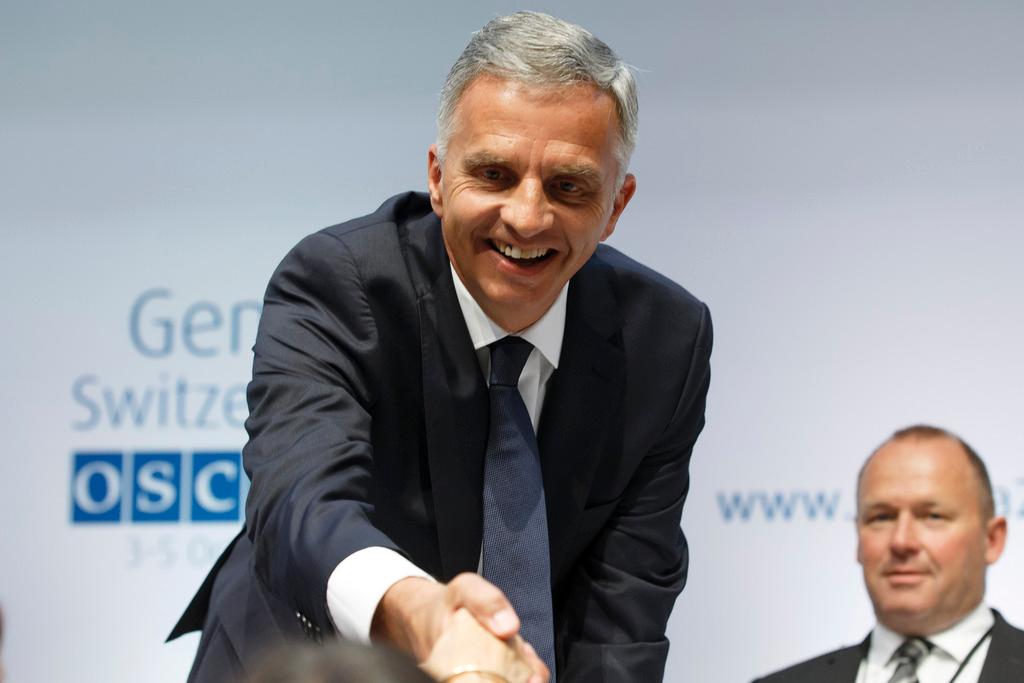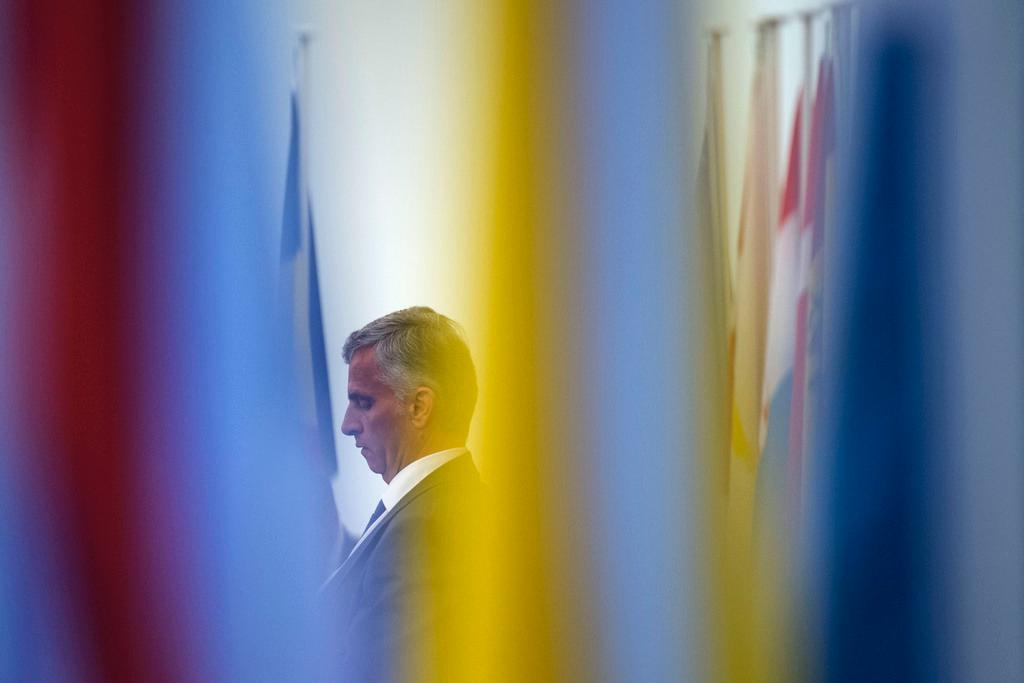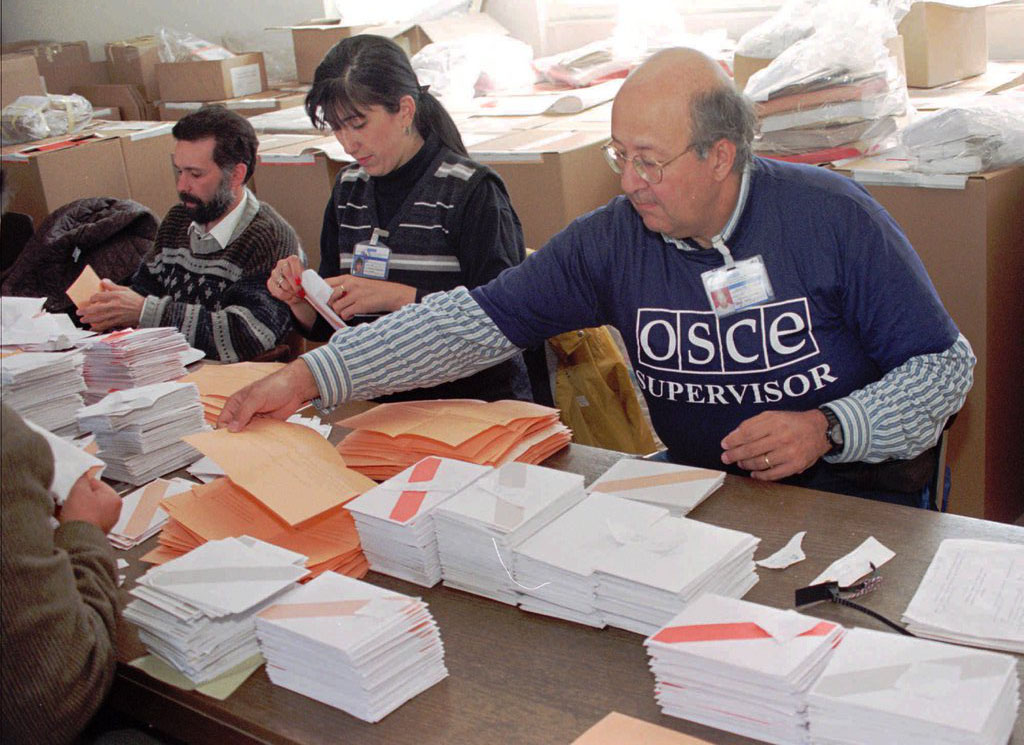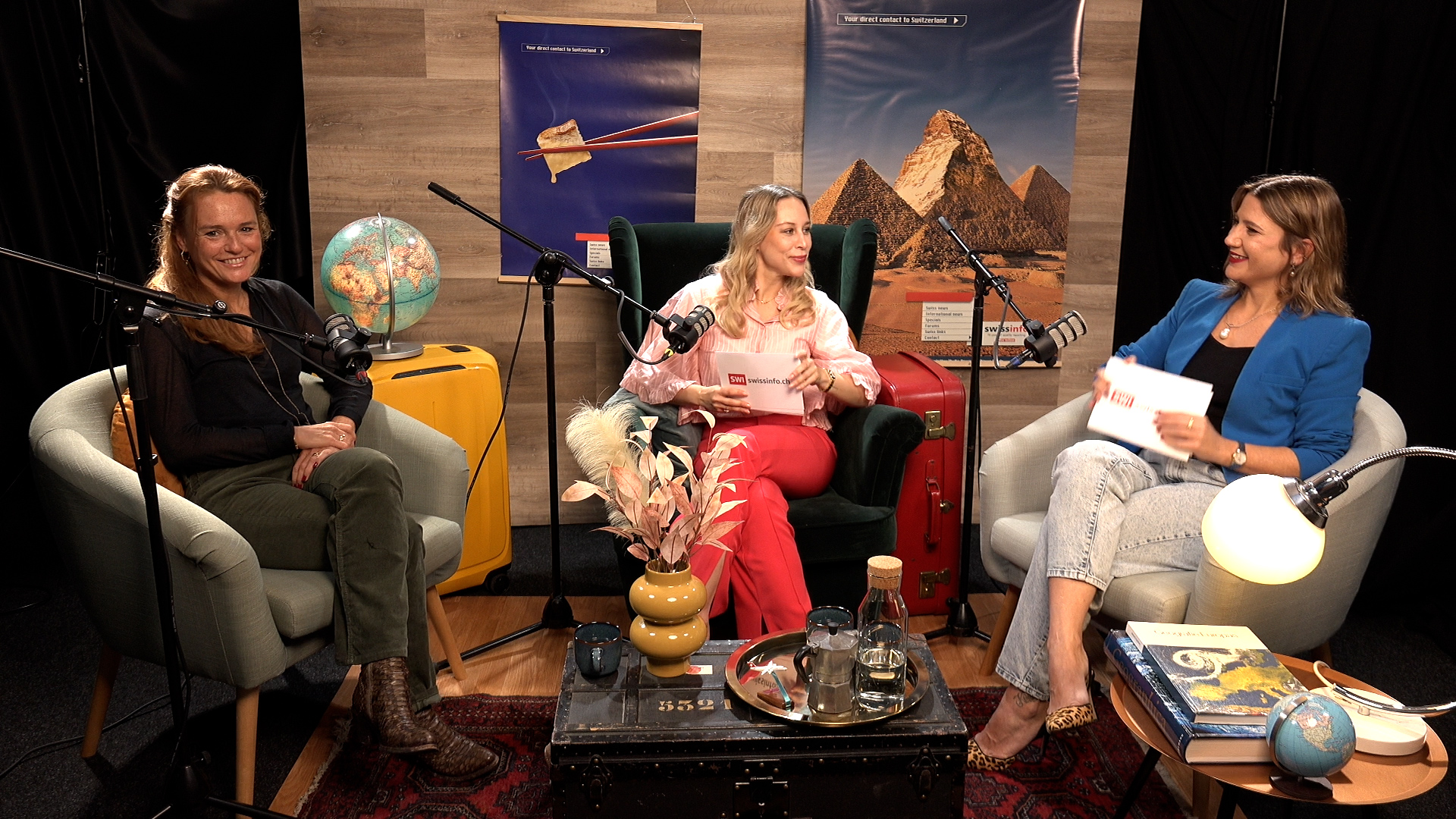
Foreign ministry wins praise for OSCE chair

The Ukraine conflict has marked Switzerland’s year-long chairmanship of the OSCE. Swiss experts and politicians from both the left and right agree Switzerland’s mediation role has helped the security organisation regain in stature.
“It has been a privileged position for Switzerland to a be at the forefront of the efforts to help de-escalate a geo-strategic conflict in Ukraine,” explained Christian Nünlist of the Center for Security Studies at the Zurich-based Federal Institute of Technology.
Nünlist says the mediation between Ukraine and Russia has put the Organization for Security and Co-operation in EuropeExternal link “back on the map” when it lost significance as a platform for east-west dialogue after the end of the Cold War in 1989. “US President Barack Obama and German Chancellor Angela Merkel are now aware of the organisation.”
In fact, it is seen as a major achievement of the OSCE during the Swiss presidency under Swiss foreign minister Didier Burkhalter to set up an observer mission for Ukraine, despite initial opposition by Moscow.
It is the biggest such undertaking in its history and the first in more than a decade.
Winning consensus in the OSCE – often considered a bureaucratic and inefficient body with a complex decision-finding mechanism – is no mean feat as experts and politicians point out.

More
Highlights of the 2014 Swiss OSCE chairmanship
“It is no doubt one of the biggest achievements of the Swiss OSCE chairman-in-office, in close cooperation with Germany,” says Nünlist.
Burkhalter – who has also held the position of Swiss President this year – was key in securing the green light from Russian President Vladimir Putin for the special OSCE monitoring mission to Ukraine, he adds.
Questions remain about whether the mission has been successful and whether the September truce between Ukraine and the separatist-held territories in the east of the country can be enforced.
But Switzerland is not to blame according to Nünlist. “On the contrary, Burkhalter successfully kept open the channels of communication with Moscow.”
Social Democrat parliamentarian Margret Kiener Nellen cautions that such peace efforts, notably an armistice, always take a long time to become fully effective.
Sanctions
As for the accusations leveled at the OSCE mission in Ukraine at regular intervals, Kiener Nellen’s parliamentary colleague Andreas Aebi points out that they are part of a propaganda war.
“The situation can’t be too serious as long as criticism is coming from different quarters – Russia, Ukraine and the United States,” says Aebi, a foreign policy specialist of the rightwing Swiss People’s Party.
Switzerland’s tightrope walk with Moscow when the West started imposing economic sanctions against Russia is considered a clever move by Kiener Nellen.
But there is no agreement among Swiss parliamentarians whether the strict impartiality as OSCE chair is needed as an additional justification for the position of the Swiss government.
It announced it would not follow Brussels, but make efforts to ensure that the sanctions can’t be bypassed in Switzerland.
Agenda setting
For the OSCE presidency, Switzerland had set its priorities in the Balkans and the Caucasus regions, particularly Georgia and Armenia/Azerbaijan, as well as for reforms inside the OSCE.
Much but not all of it has clearly suffered a setback because of the ongoing crisis in Ukraine – the Russian annexation of the Crimean peninsula and the conflict with separatists in the east of country bordering Russia.
The foreign ministers from 57 OSCE member states, including the US, Russia and Germany, and 11 partner countries are due to meet in the Swiss city of Basel later this week. The two-day gathering marks the end of the 12-month Swiss chairmanship of the world’s largest security organisation. The about 1,200 delegates in Basel will discuss a range of current affairs issues as well as internal reforms.
Serbia will take over at the helm of the OSCE in 2015, with Switzerland and Germany as co-chairs. It is the second time since 1996 the Swiss have held the rotating presidency of the organisation which was set up in 1973 as a platform of dialogue for the western world and the communist bloc in the Cold War period.
Nünlist says Switzerland still managed to put hot issues on the international agenda not least because the statutory 12-month term at the helm of the OSCE was carefully prepared and expertly conducted.
“The foreign ministry chose very topical and relevant issues such as the threat of returning Western jihadist fighters, the problem of kidnapping for ransom, torture prevention and disaster relief management.”
In a similar vein, Amnesty International is pleased with Burkhalter’s sustainable commitment as chairman-in-office of the OSCE.
“We are deeply impressed by his fight for human rights and the abolition of the death penalty worldwide,” says spokeswoman Alexandra Karle.
What remains?
For security expert Nünlist both Switzerland’s OSCE presidencies in 1996 and 2014 have been a resounding success not least because of the diligence of the foreign ministry teams, the careful preparation and the resources available.
“Both years were marked by unexpected events – the implementation of the Dayton peace accord in Bosnia-Herzegovina in 1996 and the Ukraine crisis this year. Nevertheless Switzerland was able to show it is capable mastering such difficult situations.”
And Burkhalter’s role as chairman and what it has meant for Switzerland has been applauded by parliamentarians, regardless of their political leaning.
“He has come across as very committed and credible in his role and he was visibly at ease,” says Kiener Nellen who sits on the six-member OSCE parliamentary delegation.
“It has been like winning the lottery,” adds Aebi, who is the delegation’s speaker.
Golden opportunity
Referring specifically to the crisis in Ukraine, Aebi sees a golden opportunity for a neutral country like Switzerland due to its reputation as an independent mediator, being neither a member of the European Union nor of the military North Atlantic Treaty Organization (Nato).

More
Swiss take to small stage to escape isolation
“He’s done an excellent job working discreetly behind the scenes,” adds Aebi’s party colleague and fellow parliamentarian Luzi Stamm, a staunch EU critic.
Martin Naef, who represents the Social Democrats in the foreign policy committee and co-head of a pro-European pressure group, points to praise from abroad – notably Germany.
He says senior figures in the German government have only praise for the Swiss OSCE chairmanship.
Political yield
There is general agreement among politicians that Switzerland has been able to benefit from its position at the OSCE helm for boosting bilateral relations with other countries, including Russia and Serbia and for reaffirming its role as an impartial mediator, offering its good services to all sides.
While Aebi is hoping Switzerland’s chair of the OSCE will lead to greater understanding in negotiations on the controversial free movement of people accord with the EU, Kiener Nellen sees advantages beyond the political sphere. “It is likely to be beneficial also for Swiss businesses,” she says.
At the start of the year, the Swiss foreign ministry said that the chair would be a great opportunity for young diplomats to gain valuable international experience as facilitators.
For politician Stamm the special funds approved by parliament for the OSCE chairmanship was well spent “considering the billions of francs wasted elsewhere”.
According to Kiener Nellen a final appreciation of the Switzerland’s achievements can only be made at the end of next year. “The Swiss presidency put in motion a number of projects for Serbia to pursue in 2015.”
Burkhalter has been held in high esteem, notably from German government ministers over the year for this role as OSCE chairman. German Foreign Minister Frank-Walter Steinmeier as well as former Chancellor Gerhard Schröder are quoted as singing the praises of Switzerland’s foreign minister. “Congratulations. His visit to Moscow and the meeting with the Russian president show that direct talks can make a difference,” Schröder said according to the Swiss News Agency.
The UN secretary general, Ban Ki-moon, also warmly welcomed Burkhalter’s commitment at the helm of the OSCE. On the fringes of the UN General Assembly in New York in September Ban stressed the pivotal role of the Swiss chairman in securing a ceasefire in Ukraine. In his address to the permanent OSCE council in Vienna at the beginning of November, Ban added: “The United Nations counts on the OSCE to help lead this vast region to greater security and cooperation which, in turn will help lead our world to greater peace, development and human rights. As a body with a large membership, a broad mandate, and a consensus-based culture, the OSCE is well-placed to maintain a constructive dialogue that can lead to sustainable solutions.”
US ambassador to the OSCE in Vienna, Daniel Baer, sent a tweet in mid November that leaves no doubt about his opinion of Burkhalter. “CiO President Burkhalter on combating anti-Semitism–action oriented, clear, forceful. Bravo.”

In compliance with the JTI standards
More: SWI swissinfo.ch certified by the Journalism Trust Initiative
































You can find an overview of ongoing debates with our journalists here . Please join us!
If you want to start a conversation about a topic raised in this article or want to report factual errors, email us at english@swissinfo.ch.